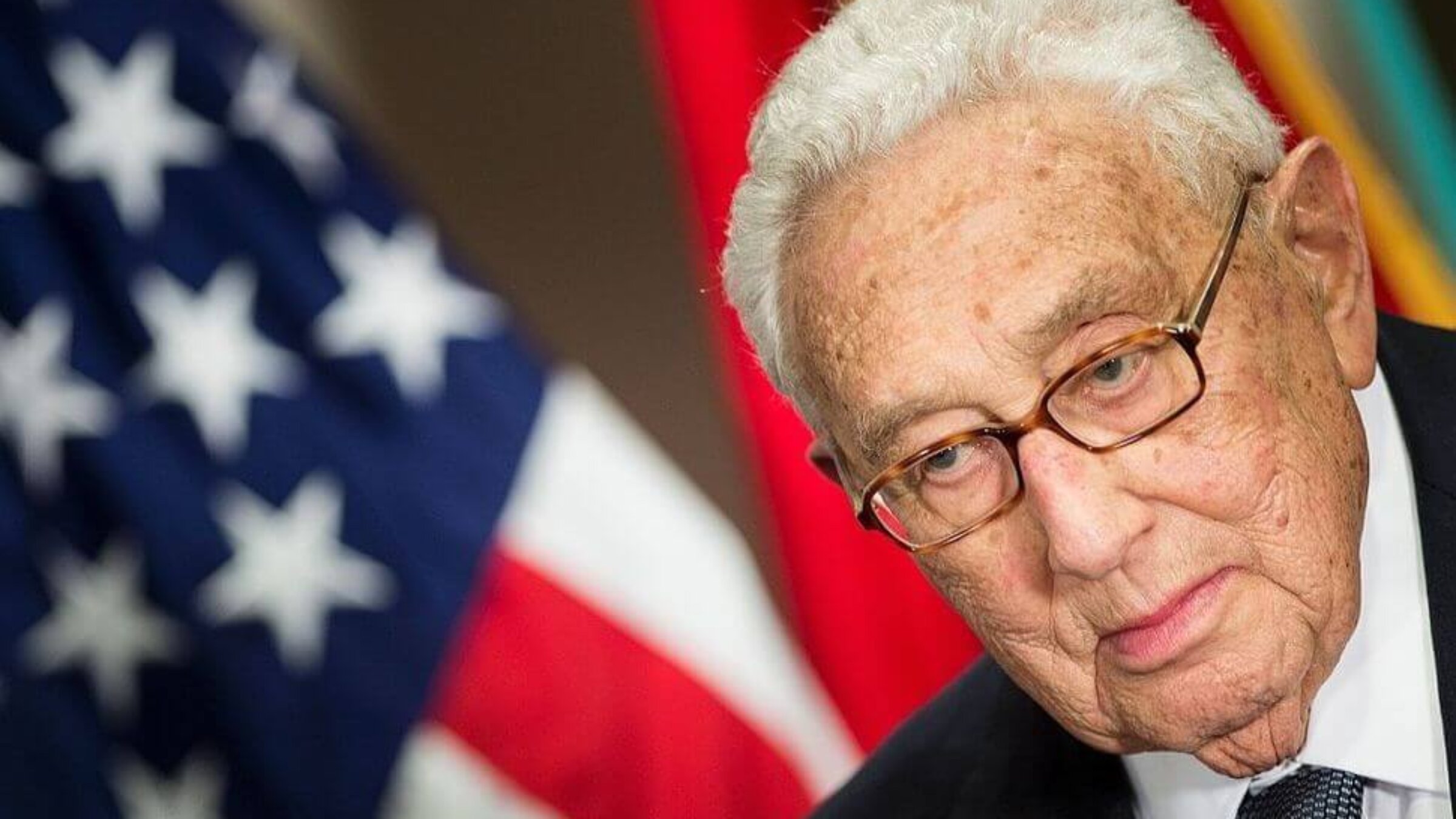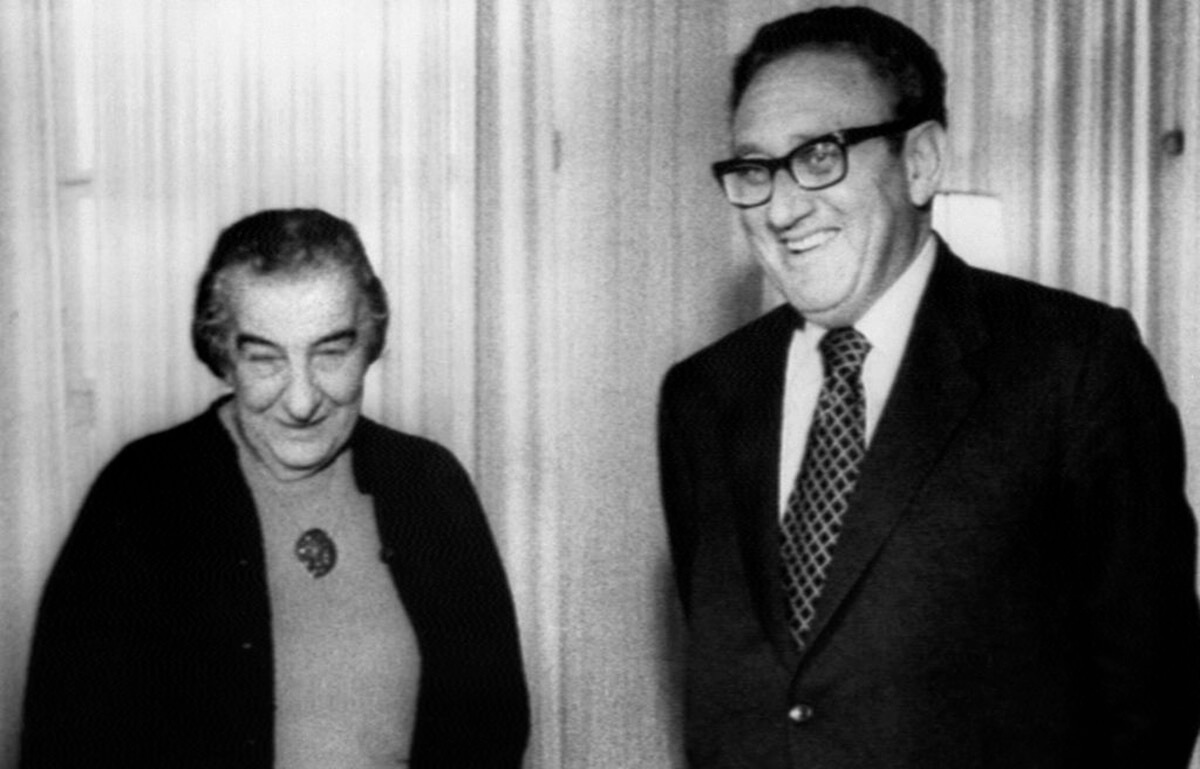Henry Kissinger and his original sins of US Middle East policy
Kissinger thwarted several opportunities to end the Israeli-Palestinian conflict for good

Former U.S. Secretary of State Henry Kissinger listens as he is introduced at a ceremony honoring his diplomatic career on May 9, 2016 at the Pentagon in Washington, D.C. Photo by Brendan Smialowski/AFP via Getty Images
Few American statesmen have attracted as much contempt and derision as Henry Kissinger, who passed away yesterday at 100.
While he was touted by many in the establishment, a relatively wide range of detractors, including Christopher Hitchens, Anthony Bourdain and Ben Rhodes, have taken him to task for an amoral approach to policy and for aiding and abetting war crimes. The list of such crimes is long: secret bombings of Cambodia, helping to overthrow the democratically elected president of Chile in 1973, encouraging the deadly “dirty war” of the Argentine military junta against its own civilians, and support for the Pakistani army as it massacred tens of thousands of Bengalis.
This long list has meant that Kissinger’s negative roles in some other areas are not as well-known and are less likely to be cited in the long list of denunciations against him. One such area is the Middle East. In fact, some are already praising his role in the region as an early architect of peace between Israel and Egypt. The reality is that Kissinger’s stubborn insistence on his personal diplomatic capabilities and distaste for the human lives at the center of this conflict thwarted multiple possibilities for lasting peace in Israel/Palestine.
Although he offered an incisive account of Kissinger’s role in Middle East diplomacy, U.S. diplomat Martin Indyk also aided the elaborate mythmaking industry around Kissinger (assiduously promoted by himself) by referring to him as a “Master of the Game” (the title of Indyk’s 2021 account of Kissinger’s diplomacy in 1973-1974) and “virtuoso” who helped carve out an elaborate regional order to be later unraveled by the future administrations who allegedly lacked his deep diplomatic wisdom. In Indyk’s telling, Kissinger masterfully achieved contradictory goals: pulling Egypt out of the Soviet orbit and into the American one and helping Israel win the Yom Kippur War of 1973 while also paving the path for the eventual Egyptian-Israeli peace.
Much of the hallowed mythology around Kissinger revolves around his role in the immediate aftermath of the 1973 war, during which Egypt and Syria led surprise attacks on Israel, which was occupying some of their territory following the 1967 War. Kissinger had served as President Richard Nixon’s national security adviser since 1969 but he was then barely two weeks into his new position as the secretary of the state — the only time in history that the same person would hold the two positions simultaneously. With Nixon deeply mired in the Watergate scandal, Kissinger was free to operate with much more power than a usual secretary of state. In October 1973 Kissinger and others put the U.S. into a DEFCON 3 alert position while the president was asleep.
In the weeks that followed Israel’s victory in the war, Kissinger held a series of marathon meetings between Jerusalem, Cairo and Damascus, meeting the likes of Prime Minister Golda Meir and presidents Anwar Sadat and Hafiz Assad. Christened as “Shuttle Diplomacy,” this period has become lore in the Kissinger mythology, with many marveling that Kissinger was able to mediate between Israeli and Arab sides that would otherwise not talk to each other.

As Nixon was forced to resign and was replaced with his vice president Gerald Ford in August 1974, Kissinger remained in his position as the U.S.’s top diplomat, making 11 more trips to the Middle East in the coming two years and helping to sign disengagement agreements between Israel, Egypt and Syria. Ford’s loss to Carter in 1976 elections meant that Kissinger was replaced as secretary of state by Cyrus Vance. He would never hold a major government role again. It fell to Carter and Vance to bring Sadat and Israeli Prime Minister Menachem Begin to Camp David and help sign the peace agreement between the two nations in 1979.
But what these celebratory accounts miss is that Kissinger’s intransigence on several points have helped prolong the conflicts of the Middle East. In fact, he missed several opportunities for helping to avoid the Yom Kippur War in the first place, while his antipathy to Palestinians helped prolong the Israeli occupation of the West Bank and, with it, the Israeli-Palestinian conflict that continues to claim so many lives to this day. Even Indyk admits that that Kissinger “might have averted the Yom Kippur War” by taking Sadat seriously earlier, and that he could have helped end Israel’s occupation of the West Bank, thus solving “the most intractable dimension of the conflict.”
As historian Salim Yaqub has persuasively argued in Imperfect Strangers: Americans, Arabs, and the U.S.-Middle East Relations in the 1970s, Kissinger avoided putting any pressure on Israel for evacuation of the West Bank, because he seemed to agree with the occupation. In August 1974, he even told his Israeli counterpart, Yigal Allon, that it would be “impossible to accept the 1967 frontiers” with either Syria or the West Bank. Kissinger thus put into place one of the most pernicious aspects of the U.S.-led peace process: in Yaqub’s words, “some mechanism that created the illusion of progress toward the 1967 borders while ensuring that those borders would never actually be restored.”
Another fatal intransigence of Kissinger was absolute opposition to any recognition of the Palestine Liberation Organization, even though, under the leadership of Yasser Arafat, the latter had come to espouse flexible politics toward Israel. In 1974, the PLO would give up its maximalist line and effectively endorse a two-state solution. In the same year, it was recognized by the United Nations General Assembly as the legitimate representative of the Palestinian people. Kissinger defied not only Arab states but close U.S. allies, such as European countries and Japan, by his insistence on excluding the PLO. As shown meticulously by historian Paul Thomas Chamberlin in The Global Offensive: The United States, the Palestine Liberation Organization and the Making of the Post-Cold War Order, he also defied his own State Department and American career diplomats in Beirut and Jerusalem. This rejection also empowered the more extreme elements amongst the Palestinian militants in a sad yet familiar tale ever since.
This style also meant that Kissinger saw everything through the prism of U.S.’s rivalry with the Soviet Union in the Cold War; a theater of “great power” politics that he enjoyed. In the aftermath of the 1973 war, while most of the international community pushed for a conference in Geneva, where the USSR and United Nations could help bring Israel and Arab countries together and solve the conflict one and for all, Kissinger preferred his fabled ‘shuttle diplomacy’ because he wanted to keep the process led by the U.S. — and by himself.
By dooming the Geneva conference, which finally took place in December 1973, Kissinger lost a crucial opportunity: cementing the security of both Israelis and Palestinians that was being guaranteed by the U.S. and the USSR — which had recognized Israel in 1948 and was adamant that Arab countries must also ultimately do the same — and the U.N.
In a constant theme of his career, Kissinger cared little for the ex-colonial states and peoples who were coming of their own on the stage of the U.N. or the lives of the millions affected. He viewed diplomacy as an abstract game of chess, and himself the chess master.
In some of his final remarks last month, Kissinger bemoaned Germany’s Arab and Muslim population as people of “totally different culture, religion and concepts” that should have never been allowed into the country in the first place. Such callousness was no surprise for a man who longed after the “great men” in the Middle East and elsewhere, but showed little concerns for ordinary men and women whose lives have long been shaped by the decisions he made.
To contact the author, email [email protected].






















